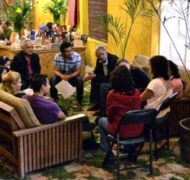Ruth and Parables: Small Group Leaders Guide Week 2
Small Group Study / Produced by Individual TOW Project member
This content is part of the Ruth and Parables curriculum, an 11-week integrated sermon and small group series on faith and work.
Introduction (from the Theology of Work Bible Commentary)
Along with aliens and the fatherless, widows received a great deal of attention in the Law of Israel. Because they had lost the protection and support of their husbands, they were easy targets for economic and social abuse and exploitation. Many resorted to prostitution simply to survive, a situation all too common for vulnerable women in our day as well. Naomi had not only become a widow, but was also an alien in Moab. Yet, if she returned to Bethlehem with her daughters-in-law, the younger women would be widows and aliens in Israel. Perhaps in response to the vulnerability they faced no matter where they might live, Naomi urged them to return to their maternal homes, and prayed that the God of Israel would grant each of them security within the household of a (Moabite) husband. Yet one of the daughters-in-law, Ruth, could not bear to be separated from Naomi, no matter the hardship. Her words to Naomi sing the depth of her love and loyalty.
Life can be hard, and these women faced its worst
Note: There are more questions here than most groups will have time to discuss. No need to do them all. You may want to select in advance which ones would be most appropriate for your group.
Read Ruth 1:16-18
Question 1
Naomi replied, “Why should you go on with me? Can I still give birth to other sons who could grow up to be your husbands? No, my daughters, return to your parents’ homes, for I am too old to marry again. And even if it were possible, and I were to get married tonight and bear sons, then what? Would you wait for them to grow up and refuse to marry someone else? No, of course not, my daughters!”
Naomi tells her daughters-in-law, Orpah and Ruth, that she has nothing left to offer them. She makes it sound like she’s a dead-end job, a failed marriage, a tiresome friendship, a hometown with no prospects. She advises them to quit her and find better opportunities somewhere else. Orpah takes her advice. Ruth does not.
- Can you identify with Orpah and Ruth’s situation, as described by Naomi—as situation so bad that it’s hopeless to continue? In what area(s) of life?
- What do you imagine prompts Orpah to accept Naomi’s advice? What happens next for Orpah?
- What do you imagine prompts Ruth to reject Naomi’s advice? What does Ruth say about it? In what ways—if any—could Ruth be speaking for you?
- After all Ruth and Naomi have suffered together, and Just when Naomi is at her most vulnerable, Ruth decides to place her faith in Naomi’s God. What do you think led to Ruth doing this?
Question 2
The most shocking words in these verses come from the lips of Naomi the Israelite when she says “Things are far more bitter for me than for you. Because the LORD himself has raised his fist against me.”
- Have you ever had that bitter feeling?
- How do you respond to someone else who says this to you?
- Is Naomi right or is this just the way she feels at that moment?
Question 3
But Ruth replied, “Don’t ask me to leave you and turn back. Wherever you go, I will go; wherever you live, I will live. Your people will be my people, and your God will be my God. Wherever you die, I will die, and there I will be buried. May the Lord punish me severely if I allow anything but death to separate us!”
Ruth’s commitment to Naomi is wholehearted and inspiring.
- Are there people you are committed to support like this? What makes you this committed to them?
- Are there people who are committed to support you like this? What does this mean for you?
- Is this asking too much of ordinary people or is this the sort of commitment to support each other that God wants to grow among Christians like us?
Read Luke 10:25-37
Question 3
Luke 10:36 From the Parable of the Good Samaritan: “Now which of these three would you say was a neighbour to the man who was attacked by bandits?”
For Naomi the Israelite it is Ruth the despised Moabite foreigner who offers her the encouragement and help she needs.
For the Jewish man who was attacked and robbed it is the despised Samaritan foreigner who is his unlikely helper and generous benefactor.
In his sermon Steve said: “According to the Bible story people you least expect are often the face and voice of God to you”
- Is there any hope (hope=remembering and seeing truthfully) that someone you despise or fear would actually help you? Someone at your workplace or school, in your family, in your community, in our church? Who might that be?
- Is there any hope that you would help someone who despises or fears you? Describe it.
In his sermons Steve said: “Be that encouraging, truthful, generous person for someone else as often as you can.”
- Is there someone you are being challenged to become more of a neighbour to like this right now? Who? What’s leading you in this direction?







